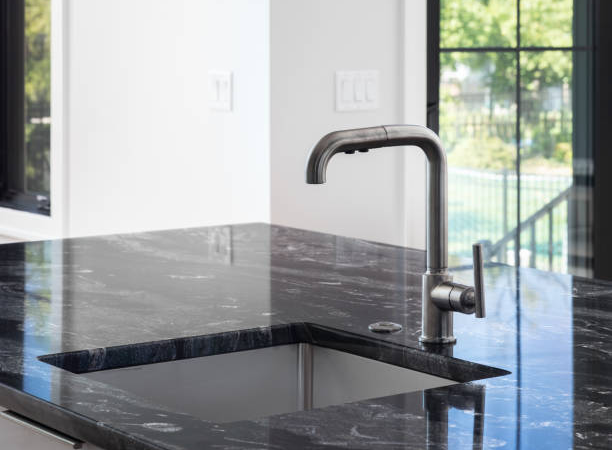Marble countertops, though elegant and luxurious, require proper care to maintain their beauty. This article will guide you through effective methods for cleaning marble countertops, ensuring they stay pristine and free of damage.
Preparation: Gather Necessary Cleaning Supplies
Before you begin the cleaning process, it’s essential to gather the appropriate supplies. Using the right tools and products will significantly impact the cleaning effectiveness and preservation of your marble countertops. Here’s what you need:
- Soft microfiber cloths or sponges
- Mild dish soap or pH-neutral cleaner
- Warm water
- Marble-specific cleaner (for tough stains)
- Baking soda (for stain removal)
Daily Cleaning Routine
Consistent daily cleaning is vital for maintaining the appearance of marble countertops. Start by wiping down the surface with a soft, damp cloth to remove loose debris. Use a mixture of warm water and a few drops of mild dish soap or pH-neutral cleaner. Avoid harsh chemicals, as they can damage the marble. Gently scrub the surface in circular motions and dry with a clean microfiber cloth.
Removing Stains: Baking Soda and Water Paste
Stubborn stains on marble countertops require a more targeted approach. Create a paste using baking soda and water:
- Mix baking soda and water to form a thick paste.
- Apply the paste to the stained area.
- Cover with plastic wrap and let it sit for 24 hours.
- Remove the wrap and gently wipe away the paste with a damp cloth.
- Rinse the area with warm water and dry it thoroughly.
This method is effective for oil and organic stains, returning your marble to its natural beauty.

Dealing with Etching: Marble Polisher
Etching occurs when acidic substances come into contact with marble, causing a dull appearance. To address etching, use a marble polisher. Apply the polisher according to the manufacturer’s instructions:
- Apply a small amount of polisher to a microfiber cloth.
- Rub the affected area in small, circular motions.
- Continue until the etching diminishes and the shine returns.
- Wipe away any excess product with a clean cloth.
- Repeat the process if necessary for severe etching.
Preventive Measures
Preventing damage to marble countertops is crucial for their longevity. Implement these measures to protect your countertops:
- Use coasters and trivets under glasses, bottles, and hot objects.
- Clean spills immediately to prevent staining and etching.
- Avoid using acidic or abrasive cleaners.
- Seal your marble countertops regularly (every 6-12 months) to protect against stains.
- Place mats or pads under heavy items to avoid scratching the surface.
By incorporating these habits, you can significantly extend the life of your marble countertops.
Conclusion
Knowing how to clean and maintain your marble countertops properly can enhance their beauty and durability. From daily cleaning routines to special stain treatments and preventive measures, maintaining the pristine state of your marble countertops is achievable with the right approach. Implement these guidelines to preserve the elegance and functionality of your marble surfaces for years to come.
FAQ
How often should I seal my marble countertops?
It is recommended to seal your marble countertops every 6-12 months, depending on the usage and type of marble.
Can I use vinegar to clean marble countertops?
No, vinegar is acidic and can cause etching and dullness on marble surfaces. It’s best to use a pH-neutral cleaner.
What should I do if my marble countertop gets etched?
Use a marble polisher to gently buff the etched areas. Follow the product instructions for best results.
Is it safe to cut directly on marble countertops?
No, cutting directly on marble can cause scratches and damage. Always use a cutting board to protect the surface.
How can I prevent stains on marble countertops?
To prevent stains, clean spills immediately, use coasters, and seal the countertops regularly. Avoid placing acidic substances directly on the marble.
